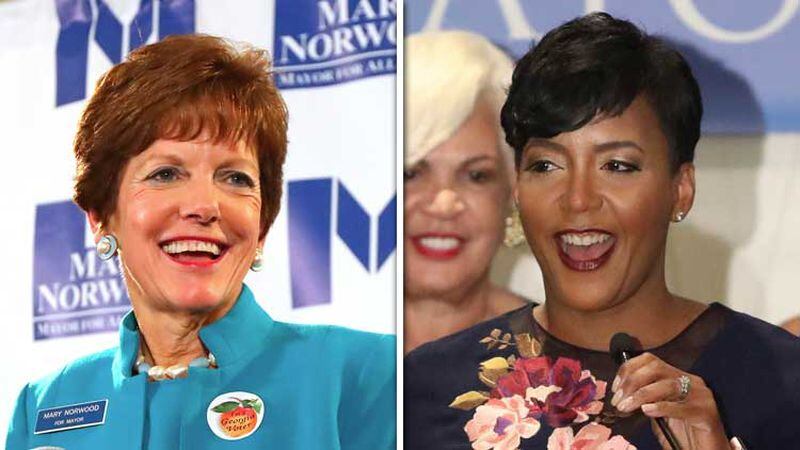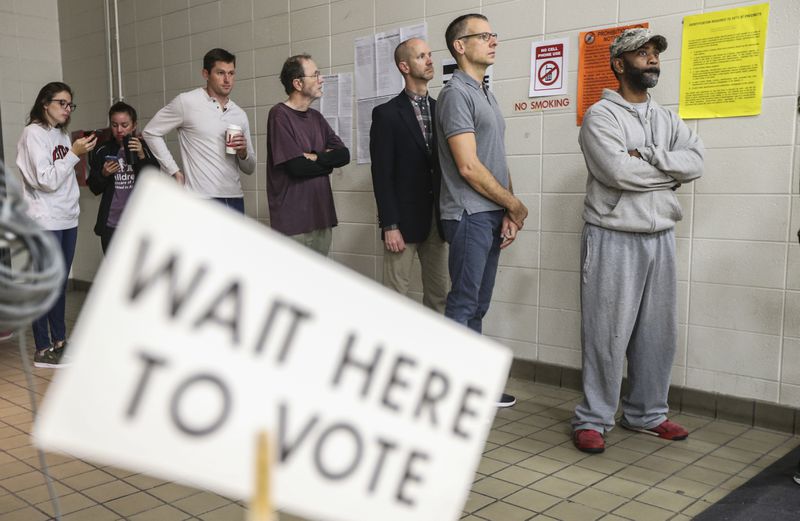The two Atlanta mayoral candidates still standing after Tuesday’s election share a similar route to victory in December’s runoff.
The women can likely capture the city's top office with a message that captures progressives – an energized, liberal, anti-establishment, racially diverse coalition of voters focused on social justice issues.
In last week’s eight-way showdown for the mayor’s seat, their political power was on full display.
Former City Council President Cathy Woolard and former state Sen. Vincent Fort, the two most progressive candidates on the ballot, earned a combined 25,444 votes, nearly 100 more than first-place finisher City Councilwoman Keisha Lance Bottoms.
Woolard, who placed third in the contest and would have been the city’s first openly gay mayor, earned the most votes in four of Atlanta’s 12 city council districts, according to an Atlanta Journal-Constitution analysis of precinct voting data.
Woolard dominated in east Atlanta and was a favorite in districts that include parts of Midtown, Virginia Highland and Morningside neighborhoods.
City Councilwoman Mary Norwood, Bottoms rival in the runoff, received more votes than Woolard, but was the top candidate in only two council districts. Those districts include Buckhead, an area with a growing white population that tends to be more affluent.
Bottoms earned the most votes of any candidate in six council districts. Those districts encompass west and south Atlanta, areas that include newly gentrified communities whose demographic changes have displaced some longtime residents.
Michael Leo Owens, an Emory University political science professor, said Norwood racked up a lot of east Atlanta support in 2009 when black and elderly voters made up a larger share of the electorate. This year, Woolard built a stronghold in east Atlanta with Norwood slipping to second or third in many of the east precincts.
Since 2009, communities east of downtown have gotten whiter and younger, reflecting the effects of gentrification, Owens said. But that electorate remains liberal and policy-oriented with issues such as transportation and the Beltline, he said.
“What I see is the dividing line we always see, it pretty much maps on what we saw in 2009, the northside and the southside,” Owens said. “But we saw this sliver that went for Norwood in 2009 that did not go for her [on Tuesday].”
The question is will voters to the east find their way to Norwood, or can Bottoms claim those voters as her own.
“Those folks might see much more in common with Keisha Lance Bottoms than Mary Norwood,” Owens said.
The same group of voters that backed U.S. Sen. Bernie Sanders in his failed bid against Hillary Clinton in last year’s Democratic primary must choose between an establishment Democrat in Bottoms or Norwood, a self-described independent, who recently balked at criticizing President Donald Trump. Or they might just stay home.
“I don’t know which one I would vote for,” said Mary Lou Bassett, a retiree who lives in Morningside and voted for Woolard. “I could see people not going to the polls if they were leaning like I was leaning. But I will make a point of deciding and going … That’s because I’m stubborn, not because it’s easy.”
Woolard is organizing a forum with Norwood and Bottoms so that her voters “can get clear answers about whether the remaining two contenders share our commitment to the values and vision that galvanized my supporters on Tuesday.”
“I’m thrilled both candidates vying for the top office have agreed to participate,” Woolard said.
‘Progressive independent’
On Thursday, Norwood didn’t hesitate at distancing herself from the president and from the Republican Party and indicated she knew exactly who she needed to reach to tip the election in her favor.
“Last year, I voted for Hillary Clinton for president,” Norwood said, in a statement. “On many occasions, I have condemned the actions and behavior of President Donald Trump when he was running for office and since he became President.”
In an interview, Norwood talked about her record championing sustainability and said she was the first mayoral candidate in 2009 to speak out for marriage equality. She recently supported legislation to decriminalize marijuana and was an early backer of Citizens for Progressive Transit, a public transit advocacy organization.
“I am a progressive independent,” Norwood said.
Credit: JOHN SPINK / AJC
Credit: JOHN SPINK / AJC
Bottoms’ campaign released a statement saying the councilwoman is only one in this race who is on the right side of progressive issues.
“Keisha is a progressive Democrat who has been going to every neighborhood in Atlanta talking about the need to make Atlanta more affordable for working people and how we need policies that focus more on the children of Atlanta,” said Phillana Williams, a spokeswoman for Bottoms. “Mary Norwood is a Republican who refused for a while to even acknowledge that racial profiling existed. One of Mary’s top aides was an early and public supporter of Donald Trump. So the choice is real clear for progressive voters.”
Williams also noted that Bottoms created displacement free zones in English Avenue and Vine City communities to help people stay in their homes when taxes and rents soar because of gentrification, and has pledged a $1 billion affordable housing program.
Early Wednesday morning, when it was clear Bottoms would make the runoff, she immediately began trying to mend fences with her opponents by praising her rivals and seeking their support.
Re-introduction is needed
Atlanta hasn’t elected a white mayor in 44 years, and it’s been nearly 140 years since the city has had leader who wasn’t a Democrat.
Bottoms is African American and has been endorsed by two-term outgoing Mayor Kasim Reed.
While women make up 58 percent of the city’s electorate, African American woman represent the largest portion of super voters – those who have voted in at least five elections during the past four years.
Fort, who was one of the candidates for mayor, said Thursday he had people reach out to him from both camps. He still hadn’t decided if he would support either candidate.
One of his supporters said she’s still going to vote for him.
"Right now, I'm ready to write in Vincent Fort," said Loretta Green, president of the Meadows Community Association in south Atlanta. Green said during Bottoms' 10 years in office, the councilwoman had not done enough for her neighborhood.
“All we have down here are abandoned buildings, liquor stores and service stations,” she said.
But Tim Franzen, who volunteered for Fort’s campaign, had already made up his mind.
Franzen said Norwood could be tone-deaf at times, and might have ties to the Republican party, but for him, she’s the best of bad choices.
“I’m not going to enjoy it,” he said. “But I’m voting for Mary.”
He said that Bottoms had resisted a community benefits agreement in the sale of Turner Field that would have given neighborhood residents a voice in the development and voted to displace families to build a park.
Franzen said it was inappropriate for Bottoms to hold a $135,000-a-year position as executive director of the Atlanta Fulton County Recreation Authority, while serving on Atlanta City Council.
“My vote for Mary is a vote against Keisha,” Franzen said.
Harold Shumacher, 69, a restaurant broker who lives in Midtown, backed Woolard and now finds himself unsure who he’ll support in the runoff.
While he said he knew Woolard’s plans front and back, he said, he knows little about how Bottoms or Norwood stand on the issues he cares about.
“I think those two candidates have to re-introduce themselves,” Shumacher said. “More than half the voters voted against you for some reason, now give me a reason why I should vote for you. You have four weeks to do that.”
A "cogent" transportation plan integrated with transit and affordable housing rank among Shumacher's top issues.
In Woolard, Shumacher said he found a candidate who could articulate her plan for her first 100 days in office. He said he hasn’t heard the same from Bottoms or Norwood.
“The other two are so good at campaigning,” he said. “But I don’t know if they’ve thought through how to hit the ground running.”
- Staff writer John Perry contributed to this report
MYAJC.COM: REAL JOURNALISM. REAL LOCAL IMPACT.
The AJC keeps you updated on the candidates, the issues, what voters are saying and much more. And since the next mayor will impact all of metro Atlanta, and the economy of the Southeast, we'll examine the results of a new poll that suggests there's still a gulf between blacks and whites in the South. We're your source for continued comprehensive coverage of the 2017 mayoral runoff as Atlanta returns to the polls Dec. 5.
Never miss a minute of what's happening in the Atlanta mayoral election. Subscribe to myAJC.com.









